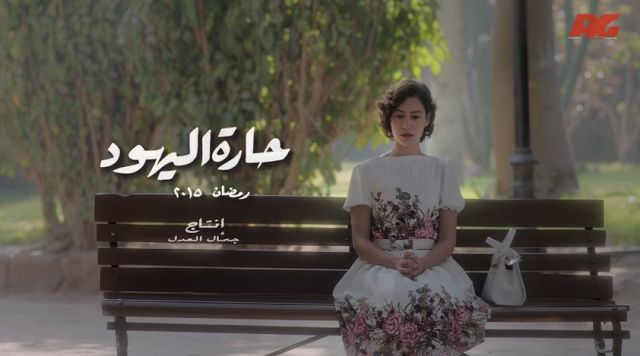“The Jewish Quarter” has sent some unsettling messages about the “Ramadan series” (or soaps), prompting commentaries in the Arab press and beyond, and finally meriting a feature article in the New York Times. This 30 episode serial, which runs through the month of Ramadan in Egypt, offers a viewpoint unlike that featured in any other serial before or after the Arab Spring. Its importance stems from its unprecedented and sympathetic treatment of Egypt’s Jews, highlighting their “fierce anti-Zionism” to Egyptian audiences. Mohamed el-Adl, director of the series and nephew to its writer, Mahdat el-Adl, describes the serial as dealing “honestly with history.” Of course, there are those who agree and disagree with this assessment.
Set in 1948 Egypt, the “Jewish Quarter” provides audiences with glimpses of a very different country from today’s Egypt, which has a much smaller Jewish community than the one that existed before the establishment of Israel. The serial’s positive depiction of Jews can disorient modern Egyptian audiences, who have been socialized by overwhelmingly anti-Semitic themes for the past six decades, themes that continue to arise in “reruns” on Arab TVs. “A Knight Without a Horse” (2002), based on the notorious anti-Semitic fraud “The Protocols of the Elders of Zion,” as described in the New York Times, represents an example of this negative socialization
Conspiracy theories of the Arab Spring thrived on anti-Semitic diatribes, which alleged that the Jews, Israel, and Zionists stood behind all the violence in the Arab world. Whether focusing on the Islamic State, Jabhat Al Nusra or some other Jihadist organization, pan-Arab nationalist and anti-Western rejectionsist sentiments hold them to be the creations of Israel, designed to divide and weaken the Arab nation. The same applies to scores of assassinations and suicide bombings all attributed to Israel and the U.S. Regardless of the military coup that overthrew the Muslim Brotherhood regime two years ago, Egyptian history and attitudes at this time appear livelier than before, – which explains why “The Jewish Quarter” broke away from the old, monotonous anti-Semitic opinions of politics and arts.
Critics approach the issue from different angles: anti-Abdel Fattah el-Sissi Islamists feel the series has not told the Muslim Brotherhood organization’s history in the best light, while some leftists feel it has tainted their history by highlighting the role of Egyptian-Jewish comradeship from the bygone days of the 1940s. Other complaints fall somewhere in between.
As expected, some criticisms cast the series in “frankly anti-Semitic terms, for making the Jews look better than the Egyptians,” a characterization the New York Times based upon one viewer’s post on the Facebook page of the filmmakers. Another lamentable criticism identifies the serial’s limitations in the scene where a Muslim military officer considers marrying a Jew. The objections go even further, linking the serial to some sort of tacit alliance between al-Sissi and Israel. And as if the program could not be condemned enough, Al Jazeera stepped in to support the Muslim Brotherhood claim that some link exists between the series and Israeli “closeness” to el-Sissi.
Inadvertently, the Israeli Embassy in Cairo lent support to the Islamists by commending early episodes, writing on an embassy-run Facebook page that, for the first time, “it [the serial] shows Jews in their real human state, as human beings before anything else, and we bless this,” a position they retracted later, according to press reports. Director el-Adl expressed confusion over the official Israeli praise, adding “The series does not support the Israelis. It is against them…Israel is the first enemy of Egypt.” Echoing the same sentiment – though phrased differently – lead actress Menna Shalabi described herself as having begged the “Egyptian media not to confuse Israel with Jews, or Zionism with Judaism.”
Leftists, on the other hand, take offense to the serial’s labeling of their communist Jewish comrades as “secret Zionists,” a false and political smear circulated by their Arab nationalist and Islamic rivals. Rivals of Palestinian and Lebanese-Syrian communists used this same distortion in the past. Ms. Haroun, the daughter of a leading Egyptian leftist of his day, complained on Facebook that the series suggested that Jewish communists had “played on the minds of people in order to turn them towards Zionism.” Concerning the merit of such allegations, Professor Joel Beinin, a historian at Stanford who has written about Egyptian Jews of the period, described the series as “more consistent with the facts than almost anything else that has appeared in Egyptian mass media in recent decades.” “Most Egyptian Jews of the 1940s identified themselves as Egyptians and not as Zionists…When the Arab nationalism of the 1950s made it untenable for Egyptians to maintain identities as both Arabs and Jews, very few migrated to Israel,” added Professor Beinin.
Other criticisms of the series center on its silence over the military’s treatment of Egyptian Jewry under President Gamal Abdel Nasser, a subject which, according to the New York Times, the series “omitted completely.” Similarly, it maintains a silence on the nationalists’role in “persecuting and ultimately pushing out many of Cairo’s Jews.” This apparently insinuates that the series made special attempts to ensure the comfort of the military and pro-al-Sissi groups concerning their war against the Muslim Brotherhood.
In the end, I wonder who wants to black out this shining page of Egyptian history during the interwar period, an era adequately covered in many history books? Supportive reviews of “The Jewish Quarter,” praise the series “for celebrating the more pluralistic ethos that prevailed under the British-backed monarchy, seeing the Egyptian Jews” as “personifications of a more liberal culture destroyed by Nasser’s 1952 coup.” Would any reasonable reviewer contest this assessment of that period?
This article appeared in Al Jadid Magazine, Vol. 19, No. 68, 2015.
Copyright © 2015 AL JADID MAGAZINE

